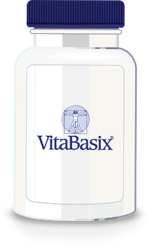Adequate calcium levels are important, especially in older people – this applies to women as well as men. Daily intake of calcium in sufficient amounts is crucial for older people and should be an integral part of maintaining one’s health adequately. Calcium is found among others in foods such as dairy products, certain fruits and vegetables, nuts, seeds, fish and eggs. It is essential for many of the body’s processes, including bone metabolism in particular, including maintaining the strength of all bones.
In addition, there are many other vitamins, minerals and nutrients that are necessary for optimal bone metabolism.
These include, among others:
MCHC: Hydroxyapatite is a special form of calcium and accounts for up to 40% of the respective mass in bone and up to 95% in teeth. Besides calcium, hydroxyapatite also contains phosphorus, a second mineral that is essential for bone formation. It can be absorbed as soon as it is consumed in micronised, i.e. greatly reduced, form.
MSM: (methyl sulfonyl methane), also known as organic sulphur, is one of the main sources of sulphur in our diet. It is found in almost all foods (milk, fruit, vegetables, cereals, meat, fish, etc.), but is often destroyed by excessive heating. Sulphur is also found in cartilage. Here it promotes important regeneration processes, including bone metabolism.
Magnesium is found in foods such as cereals, nuts, seeds, pulses, green vegetables and dried fruits. It can help strengthen the bones in many ways. Magnesium is essential for the proper absorption and metabolism of calcium, among other things; in fact, these two minerals are interdependent for proper function. Magnesium is also involved in promoting bone maintenance by supporting the production of calcitonin, a bone-maintaining hormone from the C-cells of the thyroid gland. In addition, magnesium is necessary for the proper regulation of parathyroid hormone, which is responsible for bone loss, among other things.
Vitamin C, also known as ascorbic acid, is a water-soluble vitamin. Citrus fruits are considered the classic main sources of vitamin C. But many vegetables such as peppers, broccoli and cabbage are also rich in vitamin C. Vitamin C can contribute to normal collagen formation and thus to normal bone mineralisation function.
Vitamin B12 is found mainly in animal foods such as meat, fish, seafood, eggs and dairy products. Vitamin B6 is also found in plant foods. These B vitamins contribute to a normal energy metabolism as well as to a normal function of the immune system, both prerequisites of a physiological bone metabolism.
Vitamin D can contribute to the maintenance of normal bones and muscle function. Foods such as fatty fish, mushrooms and egg yolks are rich in this vitamin. With sufficient sunlight, the skin can also synthesise vitamin D in an active form.
Calcium: Certain calcium-containing mineral mixtures, whether of animal or mineral origin, have numerous properties. Not only do they provide the organism with minerals, but they can also help regulate the body’s pH.
Piperine is found in black pepper and can increase the bioavailability of various micronutrients.



 Chronobrands
Chronobrands




Reviews
There are no reviews yet.